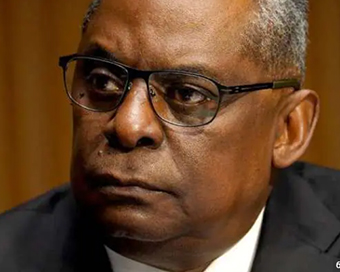Gallery
 PM Modi visit USA
PM Modi visit USA Only the mirror in my washroom and phone gallery see the crazy me : Sara Khan
Only the mirror in my washroom and phone gallery see the crazy me : Sara Khan Karnataka rain fury: Photos of flooded streets, uprooted trees
Karnataka rain fury: Photos of flooded streets, uprooted trees Cannes 2022: Deepika Padukone stuns at the French Riviera in Sabyasachi outfit
Cannes 2022: Deepika Padukone stuns at the French Riviera in Sabyasachi outfit Ranbir Kapoor And Alia Bhatt's Wedding Pics - Sealed With A Kiss
Ranbir Kapoor And Alia Bhatt's Wedding Pics - Sealed With A Kiss Oscars 2022: Every Academy Award Winner
Oscars 2022: Every Academy Award Winner Shane Warne (1969-2022): Australian cricket legend's life in pictures
Shane Warne (1969-2022): Australian cricket legend's life in pictures Photos: What Russia's invasion of Ukraine looks like on the ground
Photos: What Russia's invasion of Ukraine looks like on the ground Lata Mangeshkar (1929-2022): A pictorial tribute to the 'Nightingale of India'
Lata Mangeshkar (1929-2022): A pictorial tribute to the 'Nightingale of India' PM Modi unveils 216-feet tall Statue of Equality in Hyderabad (PHOTOS)
PM Modi unveils 216-feet tall Statue of Equality in Hyderabad (PHOTOS)Hockey India has announced a 54-member core probable squad for the upcoming senior men’s
- Satwik-Chirag return as BAI names 14-strong squad for BWF Sudirman Cup Finals 2025
- Men’s Sr Hockey Nationals to be played in division-based format from April 4
- Mensik denies Djokovic 100th title in Miami final
- KIPG: Son of a vegetable vendor, Bihar’s Jhandu Kumar eyes Worlds, 2028 Paralympics
- Hardik Singh credits hard work and team unity for receiving HI Midfielder of the Year award
US Defence Secretary to visit India to discuss partnership Last Updated : 13 Mar 2021 01:18:58 PM IST 
US Defence Secretary Lloyd Austin On the heels of the Quad summit, US Defence Secretary Lloyd Austin will visit India next week to meet Defence Minister Rajnath Singh as Washington focuses on China as an emerging threat, according to a Pentagon official.
In New Delhi, Austin will "discuss operationalising the major defence partnership that we have with India, including through enhanced information sharing, regional security cooperation, defence trade, and cooperation in new domains", Acting Assistant Defence Secretary for Indo-Pacific, David F. Helvey said on Friday after the Quad summit.He said India is "an important strategic partnership that involves cooperation with like-minded nations committed to protecting the rules-based international order".Reflecting President Joe Biden's strategic priority focus shifting to the Indo-Pacific, India is included in Austin's first trip abroad that also has US treaty partners Japan and South Korea in its itinerary.During the past year, India has faced border incursions by China along the Line of Actual Control (LAC) in Ladakh and clashes, with one in May 2020, resulting in the deaths of soldiers on both sides.During Friday's Quad summit of Biden and Prime Ministers Narendra Modi of India, Yoshihide Sugo of Japan and Scott Morrison of Australia, they discussed freedom of navigation and "freedom from coercion" in the South and East China Seas, which are basically about China.The North Korea nuclear issue and the Myanmar coup also figured in the summit agenda.Helvey said that Austin has "signalled a very early interest in focusing the department on China. He has identified China as the pacing threat and the pacing challenge for the Department"."His initial steps kind of demonstrate that this is going to be an area of continued focus, and the participation in this trip, follow-on travel to India, will provide an opportunity for exchange of views early on with key allies and partners about how we can work together and expand cooperation to support a rules-based international order."Secretary of State Antony Blinken will be with Austin for a part of the trip when they hold 2+2 meetings of the top defence and diplomacy officials in Tokyo and Seoul.But Blinken will not be coming to New Delhi, where a 2+2 dialogue was held last October.At that meeting between Singh and External Affairs Minister S. Jaishankar and former Defence Secretary Mark Esper and former Secretary of State Mike Pompeo, the US and India signed the landmark defence pact, Basic Exchange and Cooperation Agreement (BECA) for Geo-Spatial Cooperation.The agreement enables the militaries of the two countries to share high-end military technology, geospatial maps and classified satellite data.The two countries were already signatories to the Logistics Exchange Memorandum of Agreement (LEMOA), the Communications, Compatibility and Security Agreement (COMCASA), and the Industrial Security Agreement (ISA), which sealed close defence ties and paved the way for interoperability of the equipment of the defence forces of the two countries.Furthering these elements of cooperation will be on the agenda of the meeting between Singh and Austin, according to Helvey.India was designated as a major defence partner by the US in 2016 allowing it access to some defence hi-tech that would normally be available to only allies.Austin, who retired as a four-star general after a 41-year career in the US Army, has not served in Asia and, therefore, does not appear to have had involvement with India.However, in his last military position of the head of the Central Command he has dealt with Pakistan.Even before Austin's trip was officially announced, China reacted to speculations about the visit with a veiled threat in the Global Times, a Chinese publication that mirrors the Communist Party thinking.It quoted Yang Xiyu, senior research fellow at the China Institute of International Studies, as saying: "New Delhi cannot afford the cost of provoking China by publicly taking sides between Beijing and Washington."Reflecting the unease in China, the article quoted several Chinese experts who asserted that military alliance between India and the US will not work.IANS New York For Latest Updates Please-
Join us on
Follow us on








172.31.16.186







